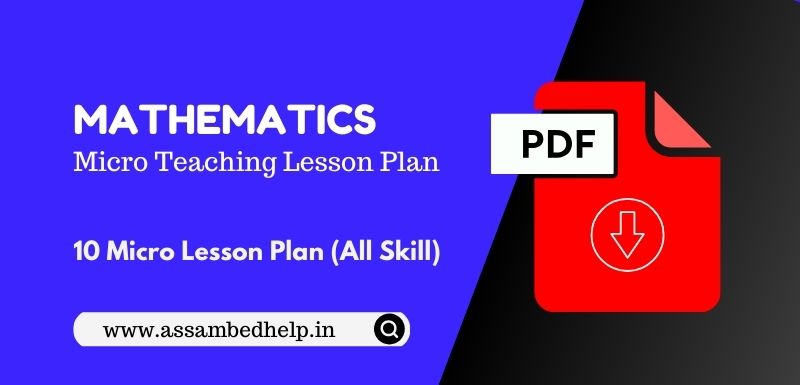Are you trying to make a lesson plan for micro-teaching? Don’t worry I am here to help you. In this post, I am going to share model mathematics micro-teaching lesson plans in PDF format for you. You will get a maths micro lesson plan for all 10 skills of micro-teaching practice in teacher training institutions.

Ready-Made Mathematics Micro Lesson Plan for All Skills of Micro-Teaching
There are 10 major skills of micro-teaching practiced in teacher training institutions or B.Ed. colleges. For a particular subject like maths, you have to make a lesson plan for all of these skills to practice micro-teaching.
You will have to understand each and every concept of micro-teaching, its skills, and its components to properly make a micro-lesson plan. I have already published posts on how to make lesson plans for these skills. You refer to the “Learn Micro-Teaching” category.
In this post, I will provide you with some ready-made micro-teaching lesson plans of mathematics. You will get math lesson plans for all major micro-teaching skills. From this, you will be able to learn how to make proper lesson plans for mathematics on all major skills of micro-teaching.
What is a Micro Lesson Plan?
A micro lesson plan is a concise and targeted instructional strategy that focuses on a specific topic or skill within a limited timeframe. Typically lasting between 20 to 30 minutes, these lessons are designed to help teacher trainees practice essential teaching skills, such as:
- Skill of writing instructional objectives in behavioral terms
- Skill of Introducing a Lesson
- Skill of Blackboard Writing
- Skill of Fluency in Questioning
- Skill of Probing Questioning
- Skill of Stimulus Variation
- Skill of Explaining
- Skill of demonstration
- Skill of reinforcement
- Skill of achieving closure
You will get mathematics lesson plans for all of these in this post. The process of making a lesson plan is simple. The only thing you need to focus on is using the components of the skill. You have to use the components in the proper place of your lesson plan.
Key Components of a Mathematics Micro Lesson Plan
When developing a micro lesson plan for mathematics, several key components should be included:
Objective:
Define what students should learn by the end of the lesson. For example, “Students will understand the concept of fractions and how to simplify them.”
Materials Needed:
List all resources required for the lesson, such as textbooks, manipulatives, or digital tools.
Introduction:
Begin with a brief overview of the topic. Try to use engaging questions to pique student interest.
Explanation:
Present the core content using clear examples. Use visual aids like diagrams or charts to enhance understanding of the topic.
PDF Download – Model Math Micro-Teaching Lesson Plans for B.Ed.
Below is a list of micro-teaching lesson plans for mathematics for all skills. Since it is difficult to attach all the PDFs in one post, I have provided a separate link for each lesson plan. Refer to the table below and get whatever lesson plan you want on mathematics.
| Sl. No. | Name of The Skill | Writing Instructional Objectives in Behavioral Terms |
|---|---|---|
| 1 | Writing Instructional Objectives in Behavioural Terms | Click |
| 2 | Introducing A Lesson | Click |
| 3 | Blackboard Writing | Click |
| 4 | Fluency in Questioning | Click |
| 5 | Probing Questioning | Click |
| 6 | Stimulus Variation | Click |
| 7 | Explaining | Click |
| 8 | Demonstration | Click |
| 9 | Reinforcement | Click |
| 10 | Achieving Closure | Click |
I hope you will get what you need. Please note that the format of these lesson plans might be slightly different from yours. So, match the format before your final submission. If you are pursuing B.Ed. in an institution in Assam or Under Dibrugarh University then these lesson plans will be perfect for you.
Also Read: 10 Science Micro Lesson Plans PDF Download
Conclusion
Micro lesson plans in mathematics are a great resource for B.Ed. students who want to become successful teachers. Future educators can greatly improve their instructional abilities and create a supportive learning environment in their classrooms by concentrating on particular talents and utilizing a variety of teaching techniques. Adopting this strategy improves their comprehension of pedagogical strategies necessary for effective mathematics instruction in addition to preparing them for real-world teaching situations.